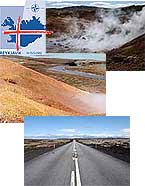|
Setting
the agenda for the modernisation of NATO
Meeting
of NATO Foreign Ministers in Reykjavik, Iceland
 |
Key security issues, including the adaptation of the Alliance
to face new challenges, were at the top of the agenda for NATO
and Partner Foreign Ministers who gathered in Reykjavik on 14-15
May. Considered as a "vital stepping stone on the road
to NATO's Summit in Prague" and to the NATO-Russia
Summit meeting in Rome on 28 May, these Spring Ministerial meetings
focused on the modernisation of NATO and its adaptation to the
changed security environment. "NATO was transformed
after the Cold War to build a new kind of security across Europe.
It was transformed yet again to meet and overcome instability
in the Balkans. Now it must change once more to deal with the
threats of a new century" explained NATO Secretary
General, Lord Robertson, during a press conference. He added
that Foreign Ministers had provided the guidance for NATO's
transformation during the two-day meeting: "Terrorism,
enlargement, new capabilities, new relationships - this is the
agenda of change".
- Terrorism and new capabilities - The need to combat
terrorism and adapt the capabilities of NATO member countries
to deal with new security threats were considered to be key
issues in the general debate on the evolution of NATO's role.
As well as terrorism, Ministers discussed the risk posed by
the proliferation of weapons of mass destruction and the use
of chemical and biological weapons. These issues will be further
discussed at the meeting of NATO Defence Ministers on 6-7
June.
- Enlargement - Ministers received a Consolidated Progress
Report on the results of the third cycle of the Membership
Action Plan (MAP). They agreed that decisions on who to invite
will only be taken at the Prague Summit. In the meantime,
all invitees must pursue their preparations actively. Individual
Annual National Programmes will be submitted in the Autumn
before the Prague Summit and the signing of the individual
accession protocols will take place no later than Spring 2003.
Croatia has joined the MAP process and will have its first
meeting with NATO member countries next Spring.
-
NATO-Russia relations - Reykjavik marked a "historic
breakthrough in NATO-Russia relations" with an agreement
on the establishment of the NATO-Russia Council, which will
replace the existing NATO-Russia Permanent Joint Council.
This new forum will "operate on the principle of consensus",
allowing NATO members and Russia to work "as equal
partners in areas of common interest while preserving NATO's
prerogative to act independently". The document will
be adopted and signed at the NATO-Russia Summit in Rome on
28 May, making 14 May the last meeting of the NATO-Russia
Permanent Joint Council.
-
Partnerships - In addition to relations with Russia,
Foreign Ministers also reviewed NATO's partnership with its
27 Partner countries within the Euro-Atlantic Partnership
Council (EAPC). At the meeting of the EAPC on 15 May, NATO
and Partner Foreign Ministers discussed several practical
proposals to strengthen their cooperation and make the Partnership
for Peace more flexible in the wake of NATO's next round of
enlargement. They also stressed the need to reinforce relations
with countries participating in the Mediterranean Dialogue.
- NATO-Ukraine relations - During the meeting of the
NATO-Ukraine Commission on 15 May, NATO Foreign Ministers
and their Ukrainian counterpart, Anatoliy Zlenko, agreed to
reinforce cooperation on political, economic and defence issues
over the next few months and present the results at Prague
this November.
In addition to these issues, NATO-EU relations were discussed
during what was described as a "work in progress"
meeting on 14 May. Ministers examined the NATO-EU strategic
partnership, ongoing operations in the Balkans, ways of developing
closer NATO-EU cooperation in response to terrorism and new
security threats, as well as cooperation in other areas. Foreign
Ministers also discussed NATO's commitment to South East Europe
and the continued presence of NATO-led troops in the Balkans.
The programme of the meetings was as follows: on 14 May, there
was a meeting of the North Atlantic Council - NATO's top decision
making body - followed in the afternoon by a NATO-Russia Permanent
Joint Council meeting and a NATO-EU meeting. On 15 May, the
Euro-Atlantic Partnership Council convened in the morning and
the event was closed by a NATO-Ukraine Commission meeting in
the afternoon.
Additional
information:

|